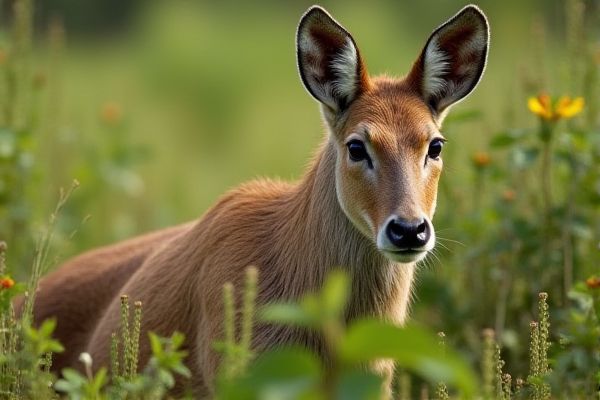
India offers a diverse range of wildlife job opportunities, catering to various interests such as conservation, research, and education. Positions can be found in national parks, wildlife sanctuaries, and NGOs focused on ecological preservation. Roles may include wildlife biologists, conservation officers, field researchers, and education coordinators, emphasizing the need for skills in ecological monitoring and community engagement. Familiarity with local ecosystems and laws, along with relevant educational qualifications, can greatly enhance your chances of landing a fulfilling role in this growing field.
Job Description
Wildlife jobs in India encompass a variety of roles focused on the conservation and management of the nation's rich biodiversity. Positions range from wildlife biologists and conservationists to field researchers and park rangers, all working to protect endangered species and their habitats. These jobs often require a strong educational background in environmental science or related fields, along with hands-on experience in wildlife observation and habitat restoration. Opportunities can be found in national parks, wildlife sanctuaries, and non-governmental organizations, allowing you to contribute to India's significant ecological efforts.
Requirement
Wildlife jobs in India require a solid educational background in fields like environmental science, biology, or conservation. Practical experience, such as internships or volunteer work in wildlife conservation projects, is often essential to build your skills. Knowledge of local flora and fauna, along with proficiency in data collection and research methods, can enhance your employability in this sector. Strong communication skills and the ability to work in remote locations are also crucial for success in wildlife management roles.
Salary and Perks Expected
Wildlife jobs in India offer a diverse range of roles, including wildlife biologist, conservation officer, and park ranger. Salaries for these positions can vary widely based on experience, education, and location, typically ranging from Rs25,000 to Rs80,000 per month. Perks often include travel opportunities, fieldwork experiences in national parks, and professional development in conservation techniques. Engaging in this field not only allows you to contribute to wildlife preservation but also provides an enriching experience connecting with nature and local communities.
Similar Job Names
- Wildlife Biologist
- Conservation Scientist
- Wildlife Technician
- Ecologist
- Park Ranger
- Wildlife Photographer
- Environmental Educator
- Wildlife Rehabilitator
- Conservation Officer
- Field Researcher
- Marine Biologist
- Wildlife Manager
- Ecotourism Guide
- Forestry Technician
- Wildlife Policy Analyst
Job Expectation Concept
Wildlife jobs in India encompass a variety of roles aimed at conserving and protecting the nation's diverse fauna and habitats. These positions can range from field biologists and conservation officers to wildlife photographers and environmental educators. Employers often seek candidates with degrees in environmental science, wildlife management, or related fields, along with practical experience in fieldwork or research. Engaging in volunteer programs or internships can enhance skills and increase your employability in this competitive sector.
Career Advantage and Weakness
A career in wildlife jobs in India offers the advantage of contributing to environmental conservation and biodiversity protection, allowing you to make a meaningful impact. Opportunities in various roles, such as wildlife biologists, conservationists, and park rangers, are on the rise, driven by increasing awareness and initiatives for wildlife protection. However, these positions often come with challenges, including low funding, limited resources, and sometimes unstable job security. A strong commitment to fieldwork and adaptability to changing conditions can be essential for success in this rewarding yet demanding sector.
Important Thing Must Know
Wildlife jobs in India offer a unique opportunity to contribute to conservation efforts while exploring the rich biodiversity of the country. With over 500 wildlife sanctuaries and national parks, roles often involve field research, habitat restoration, and species monitoring. Various organizations and government bodies provide avenues for careers in wildlife conservation, including the Forest Department and NGOs focused on environmental protection. Educational qualifications in fields like ecology, environmental science, or zoology can enhance your chances of securing a position. Engaging in wildlife jobs not only supports ecological balance but also helps in raising awareness about the importance of preserving India's natural heritage.
Alternative Career Options
India offers a diverse range of alternative career options for individuals passionate about wildlife conservation. Opportunities exist in environmental education, where you can engage communities in wildlife preservation efforts, fostering a connection to nature. Roles in wildlife tourism enable you to guide eco-friendly tours, promoting awareness while generating revenue for conservation initiatives. Other careers include working with non-profit organizations focused on habitat restoration or engaging in research that informs policy decisions for wildlife protection.
Companies List
- Wildlife Institute of India
- WWF India
- Nature Conservation Foundation
- Wildlife Trust of India
- National Tiger Conservation Authority
- State Forest Departments
- Indian Board for Wildlife
- Wildlife Conservation Society India
- Centre for Wildlife Studies
- Biodiversity Research and Conservation Society
List of Ideal City
Several cities in India provide excellent opportunities for wildlife jobs, including Bengaluru, Pune, and Chennai. Bengaluru is known for its numerous wildlife research organizations and conservation NGOs that focus on habitat preservation and biodiversity studies. Pune hosts various educational institutions offering specialized courses in wildlife biology, making it a hub for aspiring wildlife professionals. Chennai, with its proximity to several National Parks and marine reserves, offers unique roles within coastal and terrestrial ecosystems, ideal for those passionate about wildlife conservation.
 jobs-india.net
jobs-india.net